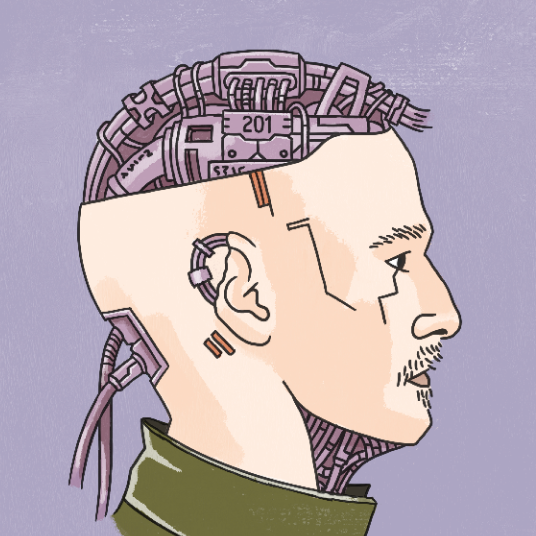Have you went down any internet rabbit holes only to come out with a deep set existential crisis? If so, what are they?
It’s somewhat specific to someone with my type of background; namely growing up in a family of young-Earth creationist, fundamentalist Christians, and learning that things like science and evolution are lies from Satan.
At some point curiosity got the better of me and I realized I didn’t even know what evolution even is, so I read up a bit about it. Then a bit more. You know, this actually kind of makes sense. Eventually the rabbit hole led to the existence of God. I remember watching a bunch of debates and expecting the most learned representatives of our Christian tradition to make some really great arguments. And… they… never… did.
Same experience. Right down to debate watching hoping for something to hang on to!
deleted by creator
Here you go https://youtu.be/uSwJuOPG4FI
I only recently tossed a Handbook Of Christian Apologetics by Tacelli & Kreeft. I was never devout, let alone outright brainwashed into anti-science nonsense, but at the cusp of my reddit atheist phase I figured a question this big deserved a fair shake. So I got a big ol’ book of the best arguments anyone had. They all sucked. So that was that.
The one that made me put the book down and go ‘yep, atheist’ was “the argument from magic.” You think about moving your hand. Your hand moves by thought alone. Magic! Therefore, Jesus. I fucking wish I was exaggerating.
Took another decade to figure out the people pushing these arguments don’t actually give a shit about being right. The point is performing loyalty to the ingroup. There’s a conclusion, and it comes from people above you, so your job is to make whatever mouth noises get there. A monotheistic god is only the purest expression of that tribalist worldview.
I’m taking a grad school course about the psychology of decision making, and the science behind how we process and use data hurts my mind and soul. At some level, we are biological logic machines. The implications of that terrify me.
Interested in reading more, can you mention the textbook(s) your course uses?
Larning about how AI (LLMs) work, what output they generate and comparing that to kids growing up, I have a similar experience.
Free will.
It’s hard to accept, but free will is just not compatible with reality. It’s like geocentrism. It seems obvious on its face because of our limited perspective, but nothing else in the universe makes sense if it’s true. We live in a mechanistic universe and cause and effect doesn’t suddenly stop when the atoms are part of a human.
I freaked out for about a week once I came to realize how much of our society is based on a scientific impossibility. Redesigning justice, ethics, healthcare, the very concept of blame, etc. to account for this is a daunting fucking prospect.
Subatomic particles act in insane ways that are absolutely not mechanical or predictible. A very limited size of object behaves “normally”. I think believing that the universe mostly acts like our everyday objects is the skewed perspective.
Our current understanding is not enough to state that with confidence. We used to be so confident with classical mechanics and even claims that physics is almost complete. God knows how long our current probabilistic model will last before we find another better model. It may be probabilistic, or it may not.
And what if its a pseudorandom generator all the way down
deleted by creator
Random behavior of subatomic particles doesn’t make free will any likelier either though.
If they act at random on a makro level their randomness would average out to zero. And that actually checks out, since the mechanical forces of the atomic and molecular level are known, observable, and provable. An apple drops from the tree to the ground, every time. Causality is still a thing, even if not observable at the subatomic level.
The only way to imagine a subatomically based free will would be some mechanic over which we, at will, could change the randomness of subatomic particles to behave in a predictable pattern and on a scale that’s grand enough to make the proverbial apple fall upward. Or at least make or synapses do something that they physically speaking wouldn’t have done otherwise.
Free will is as likely as magic. In fact it would actually be some form of magic - a volitional breach of causality itself.
on a scale that’s grand enough to make the proverbial apple fall upward
Not necessarily. An apple teetering on the edge of a cliff requires no grand change in initial conditions to have two very different journeys. If “you” are a metaphysical entity capable of altering the signals in your physical brain, your brain could deterministically amplify and enact your will, like gravity does to the apple on the cliff. If you have a metaphysical existence, this is a pretty reasonable mechanism for it to work.
Not being predictable by us does not mean they offer free will.
The preconditions are so precise that you’ll never be able to get exactly the same results from trying to do the same thing twice - you’ll never be able to do the same thing twice. But that doesn’t stop cause and effect determining the outcome. There is no place where free will can enter in to any equation at any micro or macroscopic level and just having unpredictable microscopic events doesn’t give you control of your own destiny. This is totally separate from your own perceptions of having choices you make. Personally I find myself doing things I didn’t consciously choose to do. Once you start noticing them you might find more and more.
Here’s the thing, though: it’s doesn’t matter if free will is real or not.
Well, it does if our entire justice system is based around the concept of free will.
But we never could have designed it any other way (assuming no free will)
Yeah, I guess that makes sense.
.
Absolutely. I’ve gotten myself spun up about determinism before and eventually decided that I’m going to believe in free will for the time being. Much like theism is for many, the idea of free will is kinda comforting for me and it helps me cope with reality to feel like I (and everyone else) has agency. Plus, if I’m wrong it doesn’t really matter and I never could have been right at this point in my life anyway.
Plus, if I’m wrong it doesn’t really matter and I never could have been right at this point in my life anyway.
It’s kind of like the free will version of Pascal’s Wager, amazing
That also does not matter. Spinozan Determinism can be summed up as:
“If it could have happened any other way, it would have.”
Yup. Determinism doesn’t actually change anything-- but it tricks people into thinking it does by giving them permission to remove all meaning from the world. You can accomplish the same thing by believing in nihilism.
But if we are truly deterministic beings, the factors determining our environment are incredibly important. Even (not freely) acknowledging that free will doesn’t exist we could very well (not freely) decide that we need a justice system in this society because we (not freely) want less crime, and people will (not freely) do less crime in a society where such a system is in place.
In the end it doesnt matter if people act based on free will or entirely predetermined. Or society developed as we are, and we put systems into place that seem to work. Sure, someone robbing a bank might do so for reasons that were predetermined in his brain and surroundings, but getting prosecuted for it would in turn become something that codetermines every future moment of his life.
The only think determinism really changes is perspective. It enables us to say: Okay I understand why I/they/you acted this way, or maybe I don’t understand, but can assume that there were reasons. That’s it. It lends understanding; it doesn’t have to chance anything.
Why do people always stop one step too short?
If there is no free will, the concepts of justice, blame, etc. still survive funtionally intact. If “chemical you” commits a crime, “you” are only not responsible if “you” is a metaphysical entity separate from (and that cannot control) the chemical you. But there’s no evidence that “you” aren’t simply the “chemical you”, and therefore fully responsible for your crimes. If “you” are a metaphysical entity separate from the chemical you, then “you” do actually have free will.
This is only not true if the metaphysical you exists but cannot control the chemical you, which seems reasonable but like… you can move your arm right now, by willing it to be so. Either metaphysical you has free will, or your conscious experience is the chemical you. Either way, your conscious experience is either the same as or commands your physical form, and therefore is responsible for the actions that you take, and can be blamed and given justice.
deleted by creator
There’s a really good Kurzgesagt (in a nutshell) about this topic. (Also their videos are excellent in general, highly recommend their YouTube channel).
My thoughts on this are: we may not have free will but it still feels like we make choices so I will continue to choose to do things which matters to me and enjoy my time in the universe.
I was destined to post this comment.
Robert Sapolsky agrees.
Sapolsky’s perspective ignores reality to generate talking points.
Just because a person has a limited set of choices, mostly determined by upbringing does not mean that we can predict any future action based on previous actions.
At best you may be able produce a chaotic model that gives probabilities of potential actions in any situation.
You know, there’s a very, very strong emotional incentive to feel agency, and endless aspects of experimental psychology has shown that you stress people or frazzle them or give them an unsolvable problem, and they get a way distorted sense of agency, at that point, as a defence.
That is all well and good.
I’m an engineer, so I look at this from a physical sciences point of view. The main problem with the “no free will” argument is it provides no predictive power, there is no model that can say person X will do Y (instead of A, B, C or D) in situation Z.
What is possible is giving probabilities of Y, A, B, C or D in experimental settings. But in the real world, there are too many variables interacting in a chaotic manner to even give reasonable probabilities; this is why we can only use population level statistics rather than individual level predictions.
I present, the Jim Twins:
Twins separated at birth find each other and discover they’ve led identical lives source
The two men had married wives with the same first name and had similar interests and hobbies.
Similar <> identical.
This story has little to add to the debate about free will. How many identical twins separated at birth didn’t have similar lives?
It is anecdotal, but compelling. Determinism can’t be falsified, but neither can free will. The neuroscience is interesting, and shouldn’t be dismissed. Sapolsky’s debates are informative.
Most philosophers think free will and determinism are compatible.
The universe. The Big bang, time, quantum mechanics. Is our universe infinite? Is it the only universe? Did the Big bang start ours and will it end with a big crunch and will that collapse just cause a big bang that repeats and if so what iteration of that cycle do you suppose we are in? And does each universe behave the same, similar laws and physics and such? Stars, planets, etc?
Deconstructing from religion. It was a lot. I’m better now, but being stuck in it all was overwhelming and was like being in an existential crisis every day until it ended. I just went along with it and kept it all inside for decades and it wasn’t fun.
Consciousness and our sense of self. Is consciousness an illusion? What even is “me”? It includes all the gut bacteria and mitochondria with different DNA than us and our brains are these amazing pattern recognition machines that also have abysmal memory storage and recall, but can notice the tiniest of nuance sometimes, but also can’t remember where we put the thing we were just holding 2 minutes ago. And all the while our brain is confidently telling us “I am me” and is processing all the inputs like sights and sounds and interpreting all that into what we think we see and what we think we heard. But did we? How would we know if upon seeing the color red our brain interprets that as blue and we confidently declare we see red.
In the old Star Wars Expanded Universe, there was mention of a Shawken Device which, if operable, could destroy the universe.
This has led me to conclude that the universe probably isn’t infinite.
In an infinite universe, all possible things should be happening at the same time. This would necessarily mean that someone invented a device/mechanism/reaction that could destroy the universe, and successfully activated it, thus ending the universe.
There are only two possible conclusions that I can draw from this thought experiment, which are not mutually exclusive:
- The universe is not infinite, and/or
- It is not possible to destroy the universe.
Relativity proved that time isn’t a constant thing where all things occur at “the present”. You can have situations where person 1 sees an event happen as A B and person 2 sees that same event happen as B A.
That means time isn’t some absolute framework that reality exists in, but something more like a property of matter or space or something.
Also the speed of light seems to be applicable here. Or more accurately, the speed at which events propagate through space. If you pushed a button to end the universe wouldn’t that event only go at light speed out in all directions? So maybe the button has been pushed (maybe an infinite number of times too) and all the shockwaves just haven’t gotten here yet.
You can have situations where person 1 sees an event happen as A B and person 2 sees that same event happen as B A.
This is only true if A and B are not causally related. If A causes B all observers will see A causing B.
Are you 100% on that? I thought it was recently proved that it actually could be reversed. Maybe I misunderstood. Thinking about this stuff makes my brain feel fuzzy and numb, but like, more than usual.
Yes, I am 100% on that.
If A causes B, that is true for all observers. Otherwise you get into causeless actions.
Imagine observer 1 (O1), sees one rock (A) crash into another (B) and it changes it’s direction of travel. O1 has on opinion on the sequence of events.
How imagine observer 2, (O2) watching the same events from a different perspective.
There is no situation or perspective O2 can take which would have B change direction before the collision with A.
Therefore no matter their perspective both O1 and O2 agree on the sequence of events. Thus causality is fundamental.
deleted by creator
- The universe is almost definitely not infiinte, but we will never be able to prove it.
- Have you heard of vacuum decay?
Have you heard of vacuum decay?
I know, right? They barely make consumer grade products that last nowadays.
It’s only infinite in the sense that it’s beyond our measurement. And whether or not it is infinite doesn’t even matter to us because of the speed of light and the expansion of space itself. There is a sphere around us that is all we will ever know or experience or be able to affect. Outside that sphere other things can and do exist, but we are fundamentally separated from them forever. There are entire galaxies we will never see because the light will never reach us. That is wild to me.
Well we know nowadays that the universe isn’t infinite, but is expanding, and the speed of expanding is accelerating. We don’t know if that will keep accelerating, if the universe will keep expanding forever.
How can you know or prove something isn’t infinite if you haven’t even seen all of it yet? Isn’t proving it impossible? We could prove it to NOT be infinite, but it’s like proving the non-existence of something, you can’t really prove an edge doesn’t exist just because you haven’t seen one.
Because of the cosmic microwave background.
Here, this covers it quite well on a very basic level https://www.space.com/33892-cosmic-microwave-background.html
Toxoplasma Gondii - a parasite bred through cat poop. It is extremely common, easily spread through undercooked food (especially meat). It can affect your mental state to engage in riskier and more self destructive behaviors. Testing for Toxoplasma Gondii is not standard, but it is believed that 10-15% of the US population is infected with the parasite at any given time.
That’s actually my favorite parasite! Toxo really wants to live inside a cat’s digestive tract, so much so that, when a rodent gets it in their blood, the baby toxos produce cysts in the brain (and liver and muscles) that hypnotize the rat into being attracted to cat poop. This leads to the rat hanging around where cats poop, and therefore getting eaten by the cat, and ending up happily back inside the cat’s GI tract.
Oh I’ve been there too! Read about it while planning my pregnancy. It made me feel so paranoic that I got the test done twice just in case. I never got sick with it, but paranoia was a removed.
Since then I have gotten mental health help to deal with anxiety etc.
The Dark Forest Hypothesis. A very compelling answer to the Fermi paradox: If the universe is this vast and life surely must have developed over and over all around us, how come we never found anyone?
If two civilizations ever met, chances are incredibly slim that they were comparably or even similarly developed at this exact moment in time. Think about a modern army traveling back in time 400 years and fighting a group of swordmen with horses; the medieval people would be so overwhelmed it would barely classify as a fight, and that’s just with a few hundred years of difference in technological progress. The random difference between species from different planets and systems would be far, far greater. So if two of them would meet, one of them would very likely be to the other as a god to an ant.
The universe might be brimming with life, but everyone who gets this far must be aware that half of them could wipe you out like ants, the other half could be as indomitable as a god. Cue the dark forest metaphor: There’s prey and there’s predators. We don’t know which one we are in each instance, or how many of each are out there. But how could a first contact protocoll look like in such a competetive (and very likely deadly unfair) environment?
In the dark forest only two types of species can survive: Those that attack. And those who hide.
I just think:
how many living species have been on earth? Millions probably
How many of those species are intelligent? 1
How long have this intelligent species been around? Nothing at a cosmic timescale.
How many of this intelligent species have become “interstellar”? 0
I don’t think those numbers can be extrapolate, even to the observable universe, to ensure that there are any species capable of interestellar travel around. Living species and even intelligent ones? Maybe. But a long lasting inteligent and interestellar species? We are not an example of that, so we have 0 examples to extrapolate. Only our wishful thinking that humanity will last longer and keep progressing, but that is just a hope, not real yet.
Well there is plenty of intelligent species on the planets, but having the correct evolutionary features of being intelligent and having the capacity to manipulate the environment to an extreme degree is the rare combo. Kinda nit picky but I think its an important one
Very true. Also in itself kinda creepy.
Give it time, we started emitting radio 80 years ago. When aliens look our way, they probably still see the dinosaurs or something.
This is a fascinating one.
Some things to consider, a toddler can easily defeat a baby but a 40 and 45 year old are evenly matched. There’s also the question of how much is there to learn, at some point the tech tree is pretty much done - iron is much stronger than brass but maybe light-speed heavy plasma guns are pretty much maxed out and physics simply doesn’t allow more.
This could result in interesting stalemates, a natural limit to the size of conflicts for example if it’s possible to maintain a defensive sphere that can withstand the maximum level of abuse that a circle of attackers can provide - any weapons platform too far back being unable to increase the force applied. We might get technologically perfect civilizations effectively combined to bubbles of influence around their power sources.
What is possible is that at a certain level of tech we discover how to tap into the universal internet, aliens give us the rest of the answers to physics and philosophy then show us how to build VR gear so we can explore the cosmos in perfect VR and no one ever needs to build Dyson spheres or hyperwarp megastructures because we can do anything with a dark matter powered computanium smart phone.
Your last line about hiding reminds me of a peaceful species, the Nox, from Stargate SG-1, who had many abilities one of which was to become invisible and shield their community from detection. But funnily enough, they were so powerful and advanced they may has well have been treated like gods by anyone else.
I never understood why Fermi should be a paradox.
Space is mind-bogglingly big. Insanely huge. And almost everything is empty. Primitive life (bacteria, fungus,…) might evolve on every other planet, but even mammal like life is probably not that common. Maybe 1 in 10k solar systems has them?
And now my sad hypothesis: FTL drives are simply not possible.
Also, did I mention space is huge? Sending radio signals to a planet 10k ly away is very non trivial. Unless they point a huge dish exactly at us and we point a huce dish exactly to them, we won’t hear each other.
The idea that extraterrestials will watch our TV in 100k years is absurd. (Sorry Lrrrr)
Well obviously our reality isn’t actually paradoxical. We call it that way because it seems like our estimates and conclusions don’t fit our observed reality:
Based on mathematical estimations (e.g. the Drake equation) it’s pretty unlikely that we’re the only intelligent species in our galaxy. So where is everyone?
Every answer to that question tries to resolve the seeming paradox. And your answer specifically isn’t unheard of either, it’s called the economic explanation. Throwing satellites out is obviously possible, we’ve done it and Voyager 1 will reach another solar system in roughly 30,000 years. So it’s technically possible, just very uneconomic.
I went down the psychology rabbit hole and emerged with autism.
Buddhism.
(I hope any Buddhists here find that as hilarious as I do.)
Good one
Fucked me real good
Gödel Incompleteness Theorem and the boundary of our understanding of the universe.
Eli5?
So modern math is proven to be incomplete and we cannot prove that it is consistent either. Those 2 words, incomplete and consistent have a very technical meaning here.
The first is that there is a statement in modern mathematics, which is true, but cannot be proven. And even if we expand it, there will always be such a statement. Hence, incomplete.
And the second, we cannot have a system that proves everything as that system will be inconsistent. Basically if a system can prove everything, then we can easily prove 1=1 AND 1 ≠ 1. If both are proven, then we lose meaning since there is no “truth”. But a consistent system cannot prove its self consistency. Ergo, with modern math, we cannot know if math is consistent.
Now, the problem lies in that we use math to model our perceived reality. It means there is a limit to human knowledge, or put simply, there will be something in the universe that we may never know the answer to.
My favorite is the busy beaver function. There exist, at a certain number, that our modern math cannot make any meaningful statement about the function. Here is a great video about it. (youtube link warning). But you can also look at veritasium video for more in depth explanations.
deleted by creator
I call it Gödel’s curse
The Mandela Effect caused by running the Large Hadron Collider for the first time, shifting us into an alternate universe.
I thought that was Harambe. Or was he the first sign of deviation?
Harambe was 2016, we shifted in 2010.
Roko’s Basilisk / Pascal’s Wager scared me for a little while. Then I realized it was stupid.
Also you can invert Pascal’s Wager and argue that god could not want to be worshipped, and worshipping a god result in punishment due to celebrating ignorance and blind faith.
Tri-omni God problem. The God that we are told is worthy of worship is
- Omniscient, and
- Omnipresent, and
- Omni-benevolent.
The presence of evil in the world demonstrates that no more than two out of those 3 can possibly be true at the same time. Thus if God does exist, he’s not all that and a bag of gummy bears.
deleted by creator
I’m atheist but that’s not one of the reasons for it since you can explain it logically. The usual case here is that there can’t be good without evil (either there are both or everything is the same).
Example experience from my life: You eat great food at a restaurant every now and then. Then you join the military and eat bad food every day. After a while the bad food becomes normal, and when you’re at home and just cook something that was normal before it’s great.
If everything just is great, nothing is great anymore. If everything is good, nothing is good.
I think there’s an Arthur Miller quote along the lines of man cannot appreciate sky without earth, nor heaven without hell.
deleted by creator
Collapse.
I got better! Stopped following closely.
Noise Music. How can anyone unironically listen to that stuff?
It can be very calming.
I can understand pure noise being calming; noise music? eh
For me that would be Vacuum Decay, greatly explained by Kurzgesagt:
https://piped.video/watch?v=ijFm6DxNVyI?si=ekJcAgaR58rNx2R4
Generally I’m quite chill with it because one would not feel anything. However it‘s somewhat unsettling anyway.
“This is not a place of honor”
That’s fucking creepy as shit for some reason.
I mean, it’s supposed to be.
Probably still won’t stop future humans from opening the vault, sadly.
Considering I’ve seen it printed on booty shorts, yeah, probably not.















